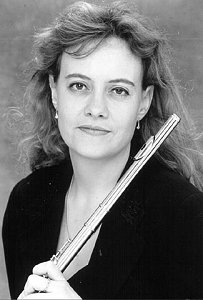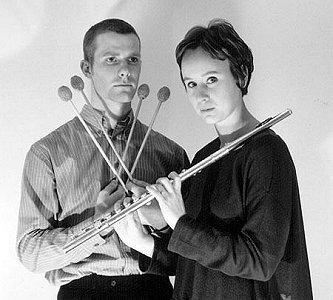Winners: Sophie Dardeau (flute) Elke Tierens & Jan Cherlet (flute & percussion)
A return visit to Antwerp, having covered the Flanders Festival Joint Venture last year, confirmed that beautiful city's cultural riches and that it is ideal for a short break. Besides the competition, we were able during our few days in Belgium to take in also the Glyndebourne co-production of Jonathan Dove's Flight, a concert of 20th century American music given by the Opera Orchestra of La Monnaie, Brussels in Antwerp and, at the great opera house which is its home, the innovative co-production of Aida with the Royal Opera House, Covent Garden that is destined to be seen soon in London.
Seen&Heard was delighted to receive an invitation to report on the contention for the seventh Orpheus Prize, which requires candidates to prepare a selection of international compositions and compulsory works by Flemish composers, the jury playing a part in deciding what is to be played at each stage. The raisons d'être of this competition centre upon chamber music, and the promotion of Flemish contemporary composers internationally. Regrettably, the Orpheus Prize 2002 attracted but few applicants from further afield and the standard of performance was very uneven for an international competition. That may relate to a gap since 1997, when the winning soloist was harpist Anne-Sophie Bertrand, who went on to impress in London as a Park Lane Group Young Artist. A more general problem is the unfortunate cultural divide between Flanders and the French-speaking part of Belgium. In both Antwerp and in Brussels we met musically involved people who were completely unaware of this competition's existence since1987; internationalism should start at home! In a musical world with too many competitions, presentation and marketing are important and need to be addressed if this one is to really take off as it deserves.
Of the 2002 non-finalists, I was impressed by the Rachmaninov Trio (Tamara Ignatieva, Peter Heiremans & Evgueni Sinaiski) who gave Résonances, a well conceived and compelling piece by Kris Oelbrandt, which exploited decaying sounds within the piano reinforced by those of the strings, music perfectly adapted to the completely silent ambience of the small hall at De Singel. By contrast, Gerhard Schedl's Gesange uber Deh Vieni was an attractive dramatic fantasy with fleeting allusions to Mozart's aria and even a quote from a Sinatra song; larger than life piano trio music with portentous pauses and soloistic moments from each player. Both works are recommended to piano trios looking to extend their repertoires; I should have wished the Rachmaninov Trio to have made it to the finals. A promising cellist, Iza Van Holen gave George Crumb's solo sonata (1958), a big piece with strong gestures, very interesting in this composer's earlier development and well deserving of a place in the repertoire for unaccompanied cello. The percussion trio Triatu brought to Antwerp Litanie 2 by one of Belgium's most important composers, Karel Goeyvaerts, a complex work with marvellously conceived combinations of instruments. It was played with care but the players were still at the stage of having to visibly count their parts. The same composer's Litanie 1 was the most compelling piece heard from the contending pianists.
The winners of both sections stood out amongst the finalists in what emerged as a year of the flute, and were worthy laureates who should have international careers. Sophie Dardeau is already well established in Paris and she gave impressive accounts of a wide selection of avant garde flute solos in the two stages, including two modern classics, Berio's Sequenza and Stockhausen's In Freundschaft. Of her novelties introduced, flautists should look out François Narboni's Neanderthal Fandango and Fuminori Tanada's "F". Best of all was Donatoni's typically witty and inventive piccolo classic Nidi, a tour de force which makes you take that little instrument very seriously. Sophie Dardeau has an attractive CD of mixed solo flute repertoire (Varese, Berio, Takemitsu's Voice and the Debussy Sonate for flute, viola and harp, etc) - Sono 231634
Our greatest pleasure came from Duo XXI's close rapport and delight in making music together. [PICT Duo XXI]Their title is a visual pun from two pairs of crossed marimba sticks and a flute! Elke Tierens established her innate musicality and absorption in the contemplative world of Giacinto Scelsi's quasi-improvisational Hyxos for alto flute, with hieratic accompaniment on two gongs and a small bell. Jan Cherlet, with a small, conveniently portable percussion kit, brought tension and electricity to a well varied piece by Frank Nuyts, Hommage a - - . In their finals recital Cherlet displayed his marimba virtuosity in Peter Klatzow's Figure in a landscape and additionally as a vocalist, delivering text in four languages (one of them Eskimo!) in Robert J. Rosen's Isstoyiwa. This duo has developed a repertoire for a satisfying combination of woodwind and percussion, just as had the British oboe/percussion duo New Noise, which gave us pleasure in the Rotterdam Gaudeamus Interpreters Competition.
There were several associated concerts, broadcast from De Singel by Antwerp Radio Central. The Namaste Italian Modern Ensemble, a quartet of voice and instruments, whose moving spirit appeared to be Guido Arbonelli, a member of the Orpheus Prize Jury. He is a charismatic clarinettist who clearly has no worries about competitions, having won 13 of them culminating in the Nederlands Gaudeamus Prize (1995), and he has a substantial discography - one of his CDs with a selection of some 300 short solo clarinet pieces written for him by composers all over the world. He began with a characteristic and vivacious two-part solo by Donatoni, Soft for bass clarinet, an instrument for which the championship of Harry Sparnay has generated a huge modern repertoire. Exhausting a tour de force though that was, Arbonelli took never a rest and continued to play in every item throughout the concert. Of the others, best were the intriguing and satisfying Cantillations of Ofer Ben-Amots, a worthy addition to the few compositions for the rewarding duo combination of clarinet & cello (Pierluigi Ruggiero). This would go well in recital with Phyllis Tate's impressive sonata, which I have not heard for some years. Joined by violinist Mauro Tortorelli, Midi Laus by Riccardo Piacentini brought a welcome note of acerbity into the programme in its thrusting first part, followed by a reflective movement with an atmospheric taped background, an ethereal drone effect which brought to mind the equally reticent tanpura which is so important in Indian classical music. The dramatic soprano Cinzia Genderian joined the three instrumentalists, most successfully in Novantotto by Gianni Francia, who managed this tricky combination well, prudently alternating voice and instruments and letting in air. The saturated accompaniment of Ken Steen's Eye Mask often 'swallowed' the voice; this singer, who is generally short on consonants, ought not to sing in English.
The Spectra Ensemble from Ghent, a London Sinfonietta-like group, and one of comparable expertise gave a broadcast concert in which the main work was Festina Lentina, a lengthy set of Profane Motets by one of the leading Belgian composers of the older generation, Lucien Goethals. This music's sound world was spare, conducted with precision by Filip Rathé; its rather dry and formal idiom seemed to hark back to Webern. Two leading Belgian singers, Lucienne van Deyck and Wilfried Van den Brande, delivered their parts with exemplary diction and excellent English pronunciation, despite which the epigrammatic texts with punch lines epitomised a chief problem throughout the Orpheus Prize days of music. Whilst one caught many words and phrases, never did the sense of the interesting ideas come through, because the audience in De Singel did not hear the radio introductions and no word sheets were provided, neither in Flemish nor in the English as sung. Festina Lentina is available (with full English texts) on a Vox Temporis CD of Goethals' vocal-instrumental music, recorded with the Spectra Ensemble. To give an example of the subtlety which we all were bound to miss at the time:
Trees
are casting shadows
because if they didn't
to the sun's rays we'd be exposed.
Just check it out:
on rainy days
trees don't have to cast shadows -
and they don't.
Performed without a hint of its programmatic inspiration, Simon Holt's dark Sparrownight was equally perplexing. Information made available was scant throughout the Orpheus Prize days, and neither the competitors nor visiting musicians provided programme notes or brief composer biographies - not even lists indicating how many movements there were in each work, so it was easy to get confused as to what one was hearing. There were no spare scores for critics, who therefore had to rely upon experience and general musical knowledge to form judgements of the performing and interpretative skills of the contestants.
The explanation for these difficulties lay in the limited administrative assistance for our friendly host Raoul de Smet, organiser of the Orpheus Prize, Chairman of the Jury and general factotum, and composer of note who did nearly everything himself! De Smet's own 't Zuid was for us the most original and inventive of the Flemish compositions we heard, a winning fantasy incorporating a celebratory collage of the flavour of the different musics to be heard in the bars and restaurants of Antwerp's 'South' - a piece which would enjoy assured success if programmed by an enterprising, outward looking UK contemporary music ensemble.
For those interested to explore Belgian music, the Belgian Documentation Centre For Serious Contemporary Music is an equivalent to UK's BMIC, with full study and loan facilities (CeBeDeM@compuserve.com). And amongst CDs recently to hand, Cypres has released a delectable boxed set of 12 CDs that includes a goodly selection of music by Belgian composers, to celebrate fifty years of the Queen Elizabeth International Music Competition of Belgium.
Peter Grahame Woolf


 Return to:
Return to: